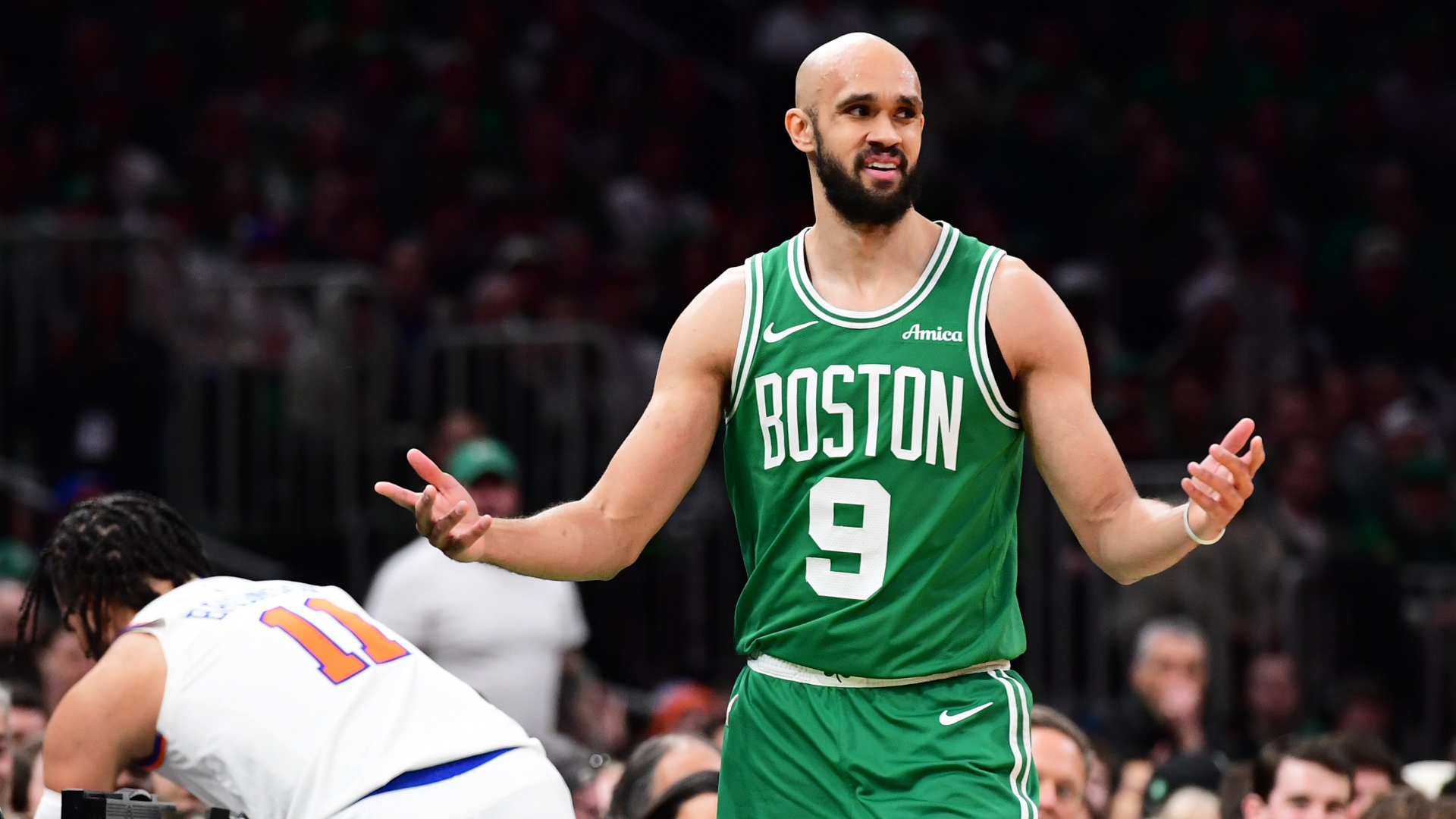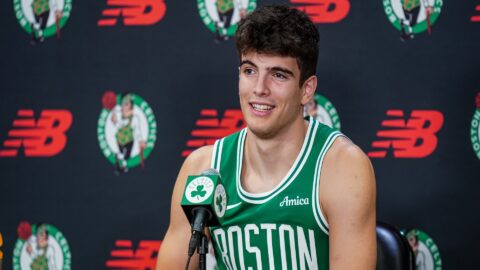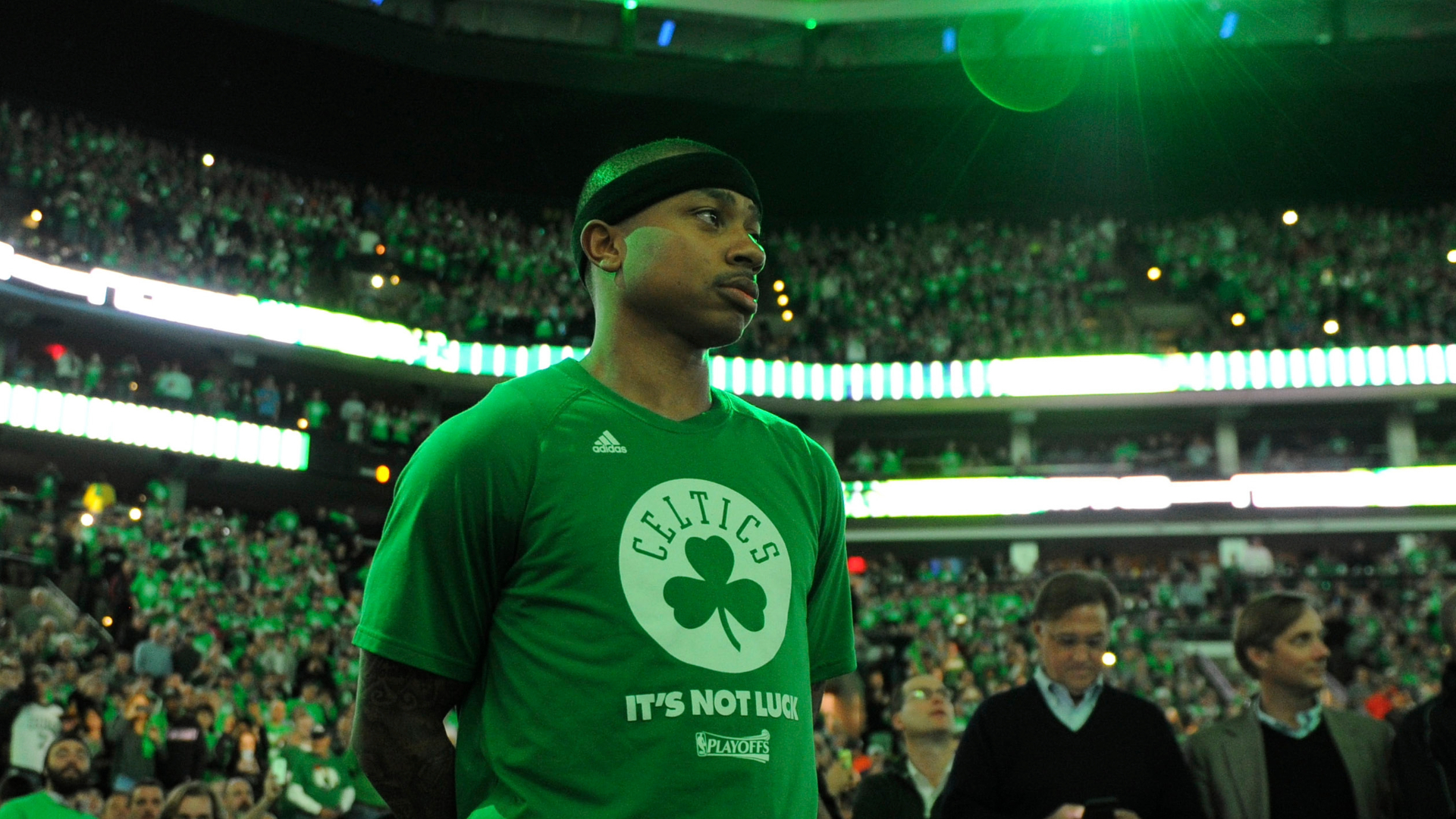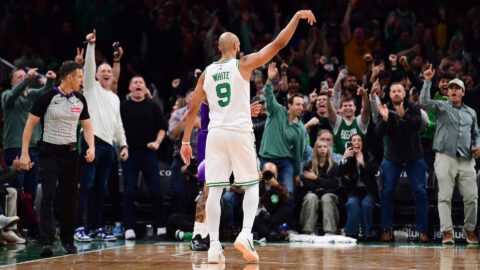When the Charlotte Bobcats lost out on the top choice in the NBA draft lottery, an uneducated observer might have said, “Big whup.”
The Bobcats, who had a 1-in-4 chance of securing the No. 1 pick, merely had to settle for the second selection. Surely there will be enough talent available to grab a pretty good player at No. 2.
There is, but there is not. Kentucky’s Anthony Davis is the undisputed prize of this draft. Although the field is considered deep, it does not hold many presumptive perennial All-Stars beyond Davis, hence the focus on the No. 1 pick. Still, there are a number of good prospects to be had, and after a lockout-condensed season the schedule to prepare for the draft had to be accelerated significantly. That could leave front offices scrambling right up to — and even on — draft day.
Each Wednesday leading up the draft June 28 in Newark, N.J., we will post a mock draft. As these things typically are, the mock drafts are merely an educated inference into each team’s thinking and by no means are a true predictor of how each team will draft.
1. Hornets: Anthony Davis (6-10, 225). PF, Kentucky, freshman. No-brainer pick by every account. His low-post game could use more fine-tuning, but scouting reports indicate he is a high-character player with outstanding defensive instincts and energy.
2. Bobcats: Thomas Robinson (6-10, 237). PF, Kansas, junior. By losing out on the first pick, Charlotte went from having the easiest decision in the draft to the toughest. The Bobcats will need to decide between the attitude and toughness of Robinson or the humility and versatility of Michael Kidd-Gilchrist. Chances are they take Robinson, a textbook power forward, rather than add another athletic but positionless swingman to their stable.
3. Wizards: Bradley Beal (6-3, 207). SG, Florida, freshman. The Wizards have a slashing point guard in John Wall and a go-to center in Nene, so what they could really use is a knockdown outside shooter. Beal may be undersized for a two-guard by scouts love his offensive game. His ability to spread the floor for Wall and Nene’s pick-and-roll game could prove invaluable to Washington.
4. Cavaliers: Michael Kidd-Gilchrist (6-7, 232). SF, Kentucky, freshman. It is not often that scouts simultaneously love everything about a player yet have so many questions about him. Kidd-Gilchrist does not shoot or handle the ball exceptionally well, according to scouting reports, and there seems to be concern that he is too nice after deferring to Davis at Kentucky. None of these things will be an issue playing alongside the humble and unselfish Kyrie Irving, who can create shots for a player of Kidd-Gilchrist’s athletic gifts.
5. Kings: Harrison Barnes (6-8, 215). SF, North Carolina, sophomore. If someone had told the Kings two years ago that they would draft Barnes, they would have been ecstatic. Had Barnes been allowed to come straight out of high school, he may have been one of the top three picks in 2010. Now there are questions about his “tendency to drift,” as a Washington Post article put it, and a puzzling inability to get to the hoop despite immense athleticism. Barnes remains one of the most intriguing talents in the draft, though, and the Kings are in “best player available” mode.
6. Trail Blazers (from Nets): Damian Lillard (6-3, 195). PG, Weber State, junior. Portland may have had the most infuriating point guard situation last season, with Raymond Felton‘s disappointing play devastating the Blazers’ playoff hopes. Few teams need a floor general as badly as them now, and by most evaluations Lillard is the ideal candidate. He has decent length and athleticism for a 6-foot-3 guard from the Big Sky conference. In essence, the Blazers will have traded Gerald Wallace for a playmaking, scoring point who can run the team for the next decade. Not a bad deal for Portland.
7. Warriors: Andre Drummond (6-11, 275). PF/C, Connecticut, freshman. If Drummond falls out of the top five, someone is going to take a chance on him at some point in the first round. The lackadaisical big man could end up being the next Hasheem Thabeet or the next Roy Hibbert, and some team is bound to bet on the latter. The Warriors are in a position to take that chance. Few front lines feature the professionalism of Andrew Bogut and David Lee, and if Drummond pans out he could be the perfect insurance policy to either getting hurt.
8. Raptors: Dion Waiters (6-4, 215). SG, Syracuse, sophomore. Many mock drafts have UConn’s Jeremy Lamb going at this pick, and Lamb may indeed be the better prospect. But Toronto apparently likes Waiters, according to The Toronto Star’s Doug Smith, and the Raptors could use the “instant offense” piece of Waiters’ scouting report. What this means for DeMar DeRozan, who started 63 of 66 games this season, mostly at shooting guard, is anyone’s guess.
9. Pistons: Jared Sullinger (6-9, 280). PF, Ohio State, sophomore. Joe Dumars, the Pistons’ president of basketball operations, could reach for Baylor’s Perry Jones III or take UConn’s Jeremy Lamb as a future replacement for Rodney Stuckey. But Dumars, a product of the Bad Boy era, has to be tempted to pair Sullinger with Greg Monroe on a bulky front line. Sullinger does not have the prettiest post moves, but in Motown that is almost a positive.
10. Hornets (from Timberwolves via Clippers): Jeremy Lamb (6-5, 180). G, Connecticut, sophomore. The question any team’s scouts must answer for themselves before drafting Lamb is, which version is real? Is it the competent secondary scorer who emerged alongside Kemba Walker in the 2011 NCAA Tournament or the frenetic player who could not seem to decide if he wanted to be a playmaker or No. 2 scoring option this season? The Hornets could have a deadly backcourt combination in Eric Gordon and Lamb, or they could have the same issue the Huskies had with Shabazz Napier and Ryan Boatright amounting to too many chiefs and not enough Indians.
11. Trail Blazers: Meyers Leonard (7-0, 240). C, Illinois, sophomore. How Portland treats this pick will depend on what they do at No. 6. Again, they need a point guard more than anything, so if they go elsewhere with their first pick, they will need to scoop up Kendall Marshall or maybe Austin Rivers here. If new general manager Neil Olshey takes care of that position early, though, he may grab a big man like Leonard here. Leonard is a bit weak on the block and lacks natural post moves, but mostly importantly for the franchise that drafted Bill Walton, Sam Bowie and Greg Oden, he is a big man with no glaring injury history.
12. Bucks: Terrence Jones (6-8, 244). SF, Kentucky, sophomore. Milwaukee could really use size, so it surely would love to get Meyers Leonard or Jared Sullinger here. Barring that, the Bucks are flush with guards after the trade that brought in Monta Ellis, and Jones would provide them with needed versatility in the frontcourt. Jones has the footwork to defend small forwards and the strength to defend power forwards, as well as shot-blocking ability unusual in a player his size. He also passes well, which is could be a key for any player who has to share the ball with volume scorers Ellis and Brandon Jennings.
13. Suns: Austin Rivers (6-4, 199). SG, Duke, freshman. Celtics fans will be crushed, but it appears unlikely that Rivers is headed to Boston to play for his dad. Phoenix could not be a more perfect fit, though. The Suns spread the floor in a way that should maximize Rivers’ offensive skills, and they are set to have ample playing time with Shannon Brown and Michael Redd becoming free agents. If Steve Nash returns, Rivers would have the added benefit of a peerless playmaker to ease him into the pro game.
14. Rockets: Kendall Marshall (6-4, 195). PG, North Carolina, sophomore. Few teams had a point guard duo to match Kyle Lowry and Goran Dragic this season, but Dragic is a free agent and set for a raise. Marshall is not much of a scoring threat, but he has a floor general’s mentality and would bring a professionalism that fits in well with one of the league’s most well-run organizations.
15. Sixers: John Henson (6-11, 220). PF, North Carolina, junior. If there is one thing Doug Collins values over all else, it is defense. Henson is not expected to be quite the force Anthony Davis is, but he has the instincts and length to become an above-average defender. Henson would have to add some meat to his bones, but Collins probably would be willing to work with that and overlook Henson’s unsightly shooting as long as he defended like a demon.
16. Rockets (from Knicks): Arnett Moultrie (6-11, 249). PF, Mississippi State, junior. Whoever picks Moultrie could get the steal of the draft. Scouts seem to love Moultrie, who moves like a guard and flashes an impressive perimeter game despite his size. The biggest knock against Moultrie seems to be his lack of a true position, which tends to work itself out for players who are good.
17. Mavericks: Perry Jones III (6-11, 235). SF, Baylor, sophomore. The Mavericks could have two players 6-foot-11 or taller who don’t play center. How mobile they are could be a different story. Dirk Nowitzki has not played defense in three seasons because he moves more poorly every year, while Jones just has the maddening tendency to simply stop working on the court. His talents are undeniable, though, and Mark Cuban, Donnie Nelson and Rick Carlisle have never been afraid of a challenge.
18. Timberwolves (from Jazz): Terrence Ross (6-6, 190). SG, Washington, sophomore. Minnesota is set at point guard with Ricky Rubio, power forward with Kevin Love and possibly center with the emergence of Niko Pekovic, who averaged 15.4 points and 7.5 rebounds after the All-Star break. The Wolves could use a wing scorer, though, and scouting reports suggest Ross could fill that role at the two or even the three in a pinch.
19. Magic: Tyler Zeller (7-0, 250). C/PF, North Carolina, senior. There is new management in Orlando, so it is no longer a sure thing the Magic will trade this pick for a toxic contract like Carlos Boozer or Elton Brand hoping it will convince Dwight Howard to stay. The new Orlando general manager, whoever it is, would be shrewd to prepare for the post-Howard era by taking Zeller to man the post if (but more likely “when”) Howard departs. The book on Zeller seems to be that he is a surefire solid NBA player that will never develop into a star.
20. Nuggets: Moe Harkless (6-9, 190). SF, St. John’s, freshman. The Nuggets could use more low-post size and defensive help, but both of those weaknesses may have as much to do with George Karl‘s style as with personnel. Therefore it may be realistic for Denver to go with what it knows: long, inconsistent, athletic ‘tweeners. Harkless, had plenty of experience playing the pseudo-four role with the Red Storm this season and could slide right into that spot with the Rich & Creamies. Plus, he is a good rebounder.
21. Celtics: Fab Melo (7-0, 274). C, Syracuse, sophomore. Despite a run to the conference finals, the Celtics’ playoff run exposed a glaring need for size. The restricted free agent market could be flush with 7-footers like Roy Hibbert, JaVale McGee and Omer Asik, but Boston could go a much cheaper route and try to nab one of the many big men available in the latter third of the first round. Teams may have concerns over Melo’s maturity, but coach Doc Rivers has shown an ability to mold many types of personalities in young players.
22. Celtics (from Clippers via Thunder): Evan Fournier (6-7, 206). SG, France. The only European player expected to go in the first round, Fournier may not land in Boston for another year. That may be precisely the reason the Celtics want him. The Celtics may want to avoid flushing a roster that already includes JaJuan Johnson and E’Twaun Moore with two more unproven youngsters, and another year of seasoning may be good for Fournier. Scouting reports indicate he needs to get stronger and improve his shooting.
23. Hawks: Royce White (6-8, 270). SF, Iowa State, sophomore. He is not quite a risk-reward player to Perry Jones’ standards, mostly because Jones’ reward seems so much greater (and more likely). Still, White owns some crazy athleticism and ball-handling skills. If his decision-making and conditioning come up to par, scouting reports indicate he could be a promising pro.
24. Cavaliers (from Lakers): Andrew Nicholson (6-9, 240). PF, St. Bonaventure, senior. The Cavs are set in the backcourt, which we addressed, freeing them to turn their focus to the post. Few players in this draft have as polished an inside-outside game as Nicholson, according to several evaluations, and his length and girth makes up for an apparently generous 6-foot-9 listing. His inability to lead the Bonnies to better than fourth place in the Atlantic 10 Conference is taken as a knock, but overlooks how deep that mid-major conference was this season. (The Bonnies won the conference tournament.)
25. Grizzlies: Doron Lamb (6-4, 210). SG, Kentucky, sophomore. Undersized, shoot-first guards are typically frowned upon, but as Jamal Crawford, Jason Terry and Ben Gordon have shown, such players can be valuable off the bench. With sixth man O.J. Mayo due to become a free agent, Memphis could be in need of an assassin off the bench and Lamb could fit that mold.
26. Pacers: John Jenkins (6-4, 220). SG, Vanderbilt, junior. Those of a certain generation cannot think of the Pacers without thinking of Reggie Miller and, before him, Chuck Person. Though a much different player from Reggie and the Rifleman, Jenkins possesses the deadly 3-point shooting accuracy those two players made a staple of Indiana’s pedigree. Aside from his shooting, the rest of his skills are fundamentally sound but scouts do not seem to believe Jenkins has the physical tools to become a productive all-around player.
27. Heat: Marquis Teague (6-2, 189). PG, Kentucky, freshman. Miami’s yearly search for an answer at point guard could lead them to the younger brother of Atlanta’s Jeff Teague. Like his brother, Marquis (pronounced “Marcus”) is considered a natural slasher who has to learn to become a point guard in the NBA. This marks the second time in three years that five Wildcats get drafted in the first round.
28. Thunder: Jeffrey Taylor (6-7, 225). SF, Vanderbilt, senior. By most accounts, Taylor loves to defend and rebound, and sets an extremely high bar for himself on the court. Nothing would fit in better with the Thunder, for whom energy and passion seems to be the first prerequisite for getting through the door of the Chesapeake Energy Arena.
29. Bulls: Tony Wroten (6-5, 205). PG, Washington, freshman. In a perfect world, Chicago would love to grab a scoring guard, but back-to-back No. 1 seeds make that difficult to achieve via the draft. In lieu of that, the Bulls could go with a player right in coach Tom Thibodeau‘s wheelhouse. Wroten is known to pressure the ball on defense and crash the boards, two traits that have been characteristic of the Bulls in their two years under Thibodeau.
30. Warriors (from Spurs): Quincy Miller (6-10, 210). SF, Baylor, freshman. Most scouting reports praise Miller’s length, competitiveness and individual skills, but there seem to be concerns about his ability to put all the pieces together. He is also rumored to be a potential target of the Celtics at Nos. 21 and 22.



